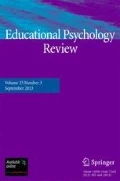Abstract
This article investigates the intertwined constructs of metacognition and self-regulation as they emerge in the works and theories of James, Piaget, and Vygotsky. To coordinate this exploration, we use an interpretive framework based on the relation of subject and object. In this framework, James’s perspective on metacognition and self-regulation is aligned with the Self, Piaget’s with the other and object, and Vygotsky’s with the medium or agency of language. We explore how metacognition and self-regulation function within the realm of human behavior and development as described in the works of each of these theorists. Key questions or issues that emerge for current research are outlined, and the limitations and benefits of each theorist’s perspective vis-à-vis metacognition and self-regulation are discussed.
Similar content being viewed by others
References
Bråten, I. (1991a). Vygotsky as precursor to metacognitive theory: I. The concept of metacognition and its roots. Scandinavian Journal of Educational Research, 35, 179–192. doi:10.1080/0031383910350302.
Bråten, I. (1991b). Vygotsky as precursor to metacognitive theory: II. Vygotsky as metacognitivist. Scandinavian Journal of Educational Research, 35, 305–320. doi:10.1080/0031383910350406.
Brown, A. (1987). Metacognition, executive control, self-regulation, and other more mysterious mechanisms. In F. E. Weinert, & R. H. Kluwe (Eds.), Metacognition, motivation, and understanding (pp. 65–116). Hillsdale, NJ: Lawrence Erlbaum..
Crocker, J., Luhtanen, R. A., & Sommers, S. R. (2004). Contingencies of self-worth: progress and prospects. European Review of Social Psychology, 15, 133–181. doi:10.1080/10463280440000017.
Dinsmore, D., Alexander, P. A., & Loughlin, S. (this issue). Focusing the conceptual lens on metacognition, self-regulation, and self-regulated learning.
Flavell, J. H. (1992). Perspectives on perspective taking. In H. Beilin, & P. B. Pufall (Eds.), Piaget’s theory: Prospects and possibilities (pp. 107–139). Hillsdale, NJ: Lawrence Erlbaum.
Harris, K. R. (1990). Developing self-regulated learners: the role of private speech and self-instruction. Educational Psychologist, 25, 35–49. doi:10.1207/s15326985ep2501_4.
James, W. (1890/91). The principles of psychology. New York: Holt.
James, W. (1992). Writings 1878–1899. New York: The Library of America.
McCaslin, M., & Hicky, D. T. (2001). Self-regulated learning and academic achievement: A Vygotskian view. In B. J. Zimmerman, & D. H. Schunk (Eds.), Self-regulated learning and academic achievement (pp. 227–252, 2nd ed.). Hillsdale, NJ: Lawrence Erlbaum.
Michel, A., & Oyduk, O. (2004). Willpower in a cognitive-affective processing system. In R. F. Baumeister, & K. D. Vohs (Eds.), Handbook of self-regulation: Research, theory, and applications (pp. 99–129). New York: The Guilford.
Piaget, J. (1928/1959). Judgment and reasoning in the child. Paterson, NJ: Littlefield, Adams, & Co (M. Warden, trans.; original work published in 1928.).
Piaget, J. (1950). The moral judgment of the child. Glencoe, IL: Free Press (M. Gabain, trans.).
Piaget, J. (1959). The language and thought of the child (3rd ed.). London: Routledge & Kegan Paul. (M. Gabain, trans.).
Piaget, J. (1962/1999). Commentary on Vygotsky’s criticisms of Language and thought of the child and judgment and reasoning in the child. In P. Lloyd, & C. Fernyhough (Eds.), Lev Vygotsky, Critical Assessments: Volume I. Vygotsky’s Theory (pp. 241–260). New York: Routledge (L. Smith, trans; original work published in 1962).
Piaget, J. (1964/1968). Six psychological studies. New York: Random House (A. Tenzer, trans.; original work published in 1964).
Piaget, J. (1976). The grasp of consciousness: Action and concept in the young child. Cambridge, MA: Harvard University Press (S. Wedgwood, trans.).
Pinard, A. (1986). ‘Prise de conscience’ and taking charge of one’s own cognitive functioning. Human Development, 29, 341–354.
Pollio, H. R. (1990). The stream of consciousness since James. In M. G. Johnson, & T. B. Henley (Eds.), Reflections on the principles of psychology: William James after a century (pp. 271–294). Hillsdale, NJ: Lawrence Erlbaum.
Son, L. K., & Schwartz, B. L. (2002). The relation between metacognitive monitoring and control. In T. J. Perfect, & B. L. Schwartz (Eds.), Applied metacognition (pp. 15–38). New York: Cambridge University Press.
Vygotsky, L. (1978). Mind in society: The development of higher psychological processes. Cambridge, MA: Harvard University Press (M. Cole, V. John-Steiner, S. Scribner, & E. Souberman, Eds. & trans.).
Vygotsky, L. (1981a). The genesis of higher mental functions. In J. V. Wertsch (Ed.), The concept of activity in Soviet psychology (pp. 144–188). Armonk, NY: Sharpe (J. V. Wertsch, trans.).
Vygotsky, L. (1981b). The development of higher forms of attention in childhood. In J. V. Wertsch (Ed.), The concept of activity in Soviet psychology (pp. 189–240). Armonk, NY: Sharpe (J. V. Wertsch, trans.).
Vygotsky, L. (1986). Thought and language. Cambridge, MA: MIT (A. Kozulin, trans.).
Wertsch, J. V. (2008). From social interaction to higher psychological processes: a clarification and application of Vygotsky’s theory. Human Development, 51, 66–79. doi:10.1159/000112532.
Zimmerman, B. J. (2001). Theories of self-regulated learning and academic achievement: An overview and analysis. In B. J. Zimmerman, & D. H. Schunk (Eds.), Self-regulated learning and academic achievement (pp. 1–37, 2nd ed.). Hillsdale, NJ: Lawrence Erlbaum.
Zimmerman, B. J. (2008). Investigating self-regulation and motivation: historical background, methodological developments, and future prospects. American Educational Research Journal, 45, 166–183. doi:10.3102/0002831207312909.
Acknowledgement
We would like to acknowledge our gratitude for the valuable guidance and insights offered by our developmental reviewers, Ivar Bråten and Eric Bredo.
Author information
Authors and Affiliations
Corresponding author
Rights and permissions
About this article
Cite this article
Fox, E., Riconscente, M. Metacognition and Self-Regulation in James, Piaget, and Vygotsky. Educ Psychol Rev 20, 373–389 (2008). https://doi.org/10.1007/s10648-008-9079-2
Published:
Issue Date:
DOI: https://doi.org/10.1007/s10648-008-9079-2



